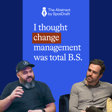
Navigating the Legal-Security-Privacy Relationship: Celaena Powder’s Experiences at Seismic
Legal, Security, and Privacy are cut from the same cloth — but it’s common to see friction between these teams. How can GCs and in-house leaders bridge this gap to form productive working relationships?
Join us as we dive into the incredible journey of Celaena Powder, VP of Legal at Seismic, as she weighs in on forming unbeatable GC-CISO duos, supporting an enterprise sales motion at a company, nurturing meaningful relationships with Sales AEs to drive business impact, and more.
We also discuss strategies for transforming the perception of Legal, building a high-performing legal team, and fostering a culture of growth and support.
Tune in now to uncover a goldmine of actionable advice and a behind-the-scenes look into how Celaena leads Legal at Seismic.
Read detailed summary: https://www.spotdraft.com/podcast/episode-6
Topics:
Introduction: 00:00
Finding inspiration for what you want to do in your career: 02:44
Accelerating professional growth when working in small teams: 11:13
Going in-house and becoming VP of Legal at Seismic: 14:08
Transforming the perception of Legal within the org: 18:28
Setting your legal team up for success: 22:30
Navigating enterprise sales as a legal team: 26:22
Leveraging privacy education to drive revenue generation: 32:54
Nurturing productive relationships between Legal and Sales AEs: 35:33
The intersection of the Legal and Security functions: 41:02
Bridging the gap between Legal, Security, and Privacy: 45:00
How the GC’s role will evolve with tech and AI evolution: 54:21
Advice for younger attorneys: 57:30
Connect with us:
Celaena Powder - https://www.linkedin.com/in/celaenapowder/
Tyler Finn - https://www.linkedin.com/in/tylerhfinn
SpotDraft - https://www.linkedin.com/company/spotdraft
SpotDraft is a leading CLM platform that solves your end-to-end contract management issues. Visit https://www.spotdraft.com to learn more.



















